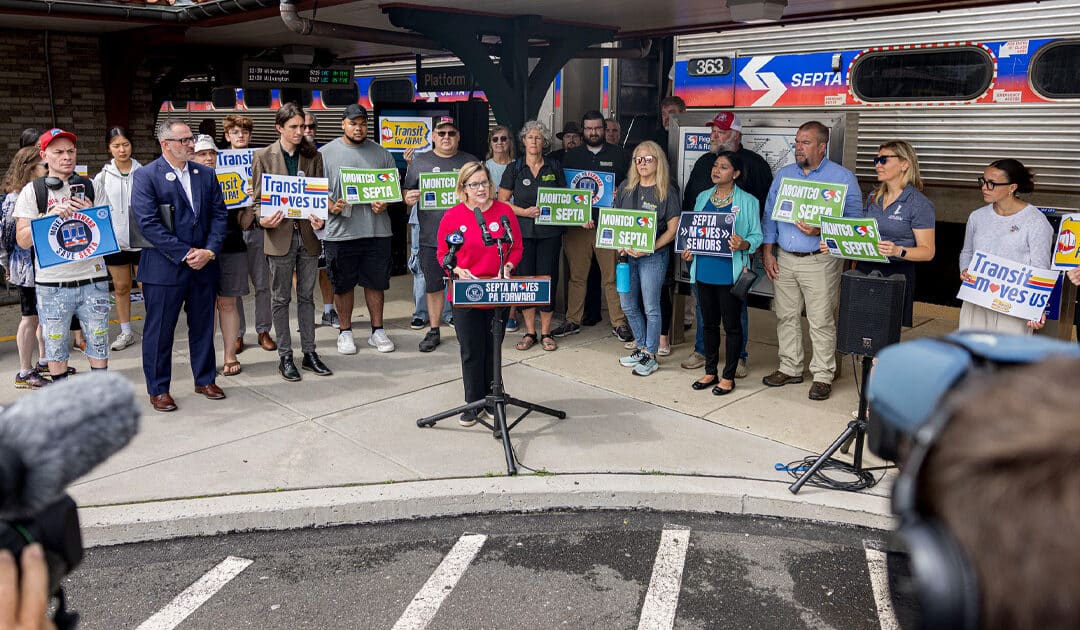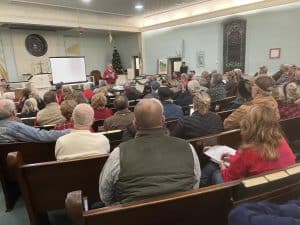Pennsylvanians can’t afford to live without a fully funded public tranit system. This was the message State Senator Maria Collett sent to her Republican colleagues Wednesday.
“For far too long, Pennsylvania’s public transit systems have been underfunded and underappreciated by politicians in Harrisburg,” Senator Collett said. “I’m hosting this rally to send a clear message to those folks: failing to fund public transit is not an option. A strong, sustainable, and fully funded transit system is key to a strong, sustainable, and fully realized future for Pennsylvania. It’s not rocket science – it’s basic economics.”
Collett hosted a rally at the Lansdale Train Station in Montgomery County with elected officials and advocates, urging the state Senate to pass The Public Transportation Trust Fund Transfer Act. All representatives from Bucks County voted to pass the bill, with the exception of Craig Staats (R-145) and Kristin Marcell (R-178). The bill passed the House on June 17 with a bipartisan vote of 107-96.
“I want everyone here today to call on Senate Republicans to use their majority for good, to help the people of Pennsylvania for a change and pass HB 1364,” Collett said. “We will not stop until our colleagues on the other side of the aisle see this as the important issue it is across our commonwealth and make sure that this funding is in the governor’s budget this year.”
The bill would invest $292 million into mass transit funding for all of Pennsylvania’s counties, support 52 transit systems, and it would allow 39,000 people to remain employed by public transit agencies. The sales tax would not increase, but the existing amount of money already allocated to public transit funding will increase from 4.4% to 6.15%.
The bill comes in light of SEPTA announcing a drastic budget cut in April, involving shutting all rail services by 9 p.m., raising the fare from $2.50 to $2.90 per ride, removing 50 bus routes, ending service on five regional rail lines, and closing 66 stations. The causes of SEPTA’s $213 million budget deficit, which starts July 1, include the end of COVID-relief funds and drop in ridership after the pandemic.
Before running for PA state representative, Steve Malagari served on the Montgomery County Transportation Authority. To the crowd at the station, he reported that each year more than 1,000 seniors come to his district office and SEPTA card events looking for help to acquire a senior fare card.
“The story we hear most often is that they need to get to their doctor’s offices. They need to get their medical appointments,” Malagari said. “These trains are a direct link to essential medical care.”
Malagari said the PA House Democratic Caucus asked people from southeast Pennsylvania to share their personal stories about SEPTA impacting their personal lives. One story came from a Bucks County resident named Tammy, a transition teacher from the Bristol Borough School District where she provides services for young people with special needs. Tammy started a program that relied on SEPTA several times through the school year, where they could walk to the Bristol train station and travel to the city easily. They also visited SEPTA headquarters to acquire reduced fare cards, which would increase students’ chances of obtaining employment in their community.
“She continued to write, ‘my students specifically are on the spectrum and struggle to navigate their community independently. This program has really opened their eyes to places that they can travel without depending on family and friends,’” said Malagari.
Rachel Bollens, Lansdale Borough Councilwoman, spoke about SEPTA’s leadership in climate investments, with its “fleet” of full electric buses and regenerative braking.
“A strong, sustainable, and fully funded transit system is key to a strong, sustainable, and fully realized future for Pennsylvania. It’s not rocket science – it’s basic economics.”
Yet with SEPTA’s new budget, these climate investments may be futile. In an analysis conducted by WHYY’s Climate Desk, the increase in drivers on the road due to SEPTA cuts would increase greenhouse gas emissions from Philadelphia’s transportation sector by about 4%.
“We don’t need to cut lines and increase fares to band-aid our transit for a tenuous survival. What we need is dedicated, statewide funding and investment,” Bollens said. “Investments in public transit are essential not only to providing access and alleviating traffic congestion, but are also at the forefront of technologies to reduce our carbon footprint and provide cleaner and healthier air for our families.”
Connor Descheemaker, the statewide campaign manager for Transit for All PA, asked the crowd to remember the 2023 I-95 Bridge collapse, which gained national coverage.
“That was something viewed nationally [where we said] we need to do everything we can to solve this problem immediately,” Descheemaker said. “How many people use that every day? How many car trips? 195,000. SEPTA moves 800,000 people per day – four times as many.”
READ: A SEPTA Funding Boost Is Uncertain Amid a Complex State Budget Struggle
According to Descheemaker, 2026 will be a big year for celebrating Philadelphia, with the FIFA World Cup, the U.S. Semiquincentennial, and a TED Talks conference. However, Descheemaker said he believes without reliable and robust transit, none of these events would take place in Philadelphia.
Additionally, Descheemaker said the first questions warehousing and distribution developers ask when they arrive in a city is about public transit for workers.
“This is an issue that cannot be boiled down to something just for Philadelphia, or just for Pittsburgh,” Descheemaker said. “This is an urban-rural solidarity opportunity.”
The Public Transportation Trust Fund Transfer Act has moved to the senate, and is currently a matter for the Transportation Committee.







